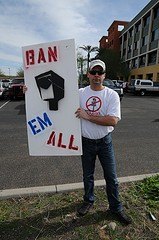Red Light Cameras Routed at Ballot Box
The public rejected the use of photo enforcement in five more municipal referendum elections Tuesday. America’s fourth-largest city, Houston, Texas, was home to the most hotly contested vote. The group Citizens Against Red Light Cameras, run by brothers Paul and Randy Kubosh, gathered enough signatures to force the issue onto the ballot against the wishes of the city council and in spite of a legal attack from camera operator American Traffic Solutions (ATS).
Outspent by a factor of ten to one, the group nonetheless won a majority of the 335,778 votes cast on the measure. According to campaign finance disclosure documents, ATS poured $1,746,000 into the race, in a desperate attempt to salvage one of the company’s most important accounts.
“Despite the opposition having every conceivable advantage the people saw through the hype and the emotional blackmail and saw the cameras for what they are, a money making scheme that violates our constitutional rights and risks driver safety for money,” Citizens Against Red Light Camera spokesman Philip Owens told TheNewspaper.
Another ATS account was canceled by citizens in nearby Baytown, where 58 percent voted to terminate the red light camera program.
“Despite being far outspent, sued and harassed we ultimately prevailed because the truth was on our side,” initiative sponsor Byron Schirmbeck said in a statement. “We are hopeful that the legislature will take up a statewide camera ban this next session so citizens won’t have to rip the cameras out city by city. We also urge the Baytown council to abide by the will of the people, no matter what the outcome of any future lawsuits by the camera company they partnered with… The people have spoken, bring the cameras down.”
On the west coast, the vote in Mukilteo, Washington was 70 percent against the automated ticketing machines. Tax-cutting initiative guru Tim Eyman organized the effort which earned a state supreme court order denying the attempt of ATS to block the people from voting. In Anaheim, California there was no camera vendor defending the program because the mayor and city council decided on their own to add a charter amendment prohibiting the use of red light cameras. The measure passed handily with 73 percent of the 45,000 votes cast.
“I am pleased with the outcome of today’s red light camera ballot issue,” Anaheim Mayor Curt Pringle said in a statement. “Anaheim’s voters recognized that red-light cameras are not a proven deterrent to traffic violations or traffic accidents, and I happen to agree with that assessment. Other cities have chosen to use red-light cameras as revenue producing tool, but the city council disagreed so we (city council) took the vote to the people, and they have spoken.”
Garfield Heights became the fifth Ohio city to ban red light cameras and speed cameras, with a majority of the 9,194 votes cast insisting on the termination of all automated ticketing.
Earlier this year, 61 percent of Sykesville, Maryland voters overturned a speed camera ordinance. In 2009, eighty-six percent of Sulphur, Louisiana rejected speed cameras. The November elections included three votes: 72 percent said no in Chillicothe, Ohio; Heath, Ohio and College Station, Texas also rejected cameras. In 2008, residents in Cincinnati, Ohio rejected red light cameras. Seventy-six percent of Steubenville, Ohio voters rejected photo radar in 2006. In the mid-1990s, speed cameras lost by a two-to-one margin in Peoria, Arizona and Batavia, Illinois. In 1997, voters in Anchorage, Alaska banned cameras even after the local authorities had removed them. In 2003, 64 percent of voters in Arlington, Texas voted down “traffic management cameras” that opponents at the time said could be converted into ticketing cameras. Photo enforcement has never survived a public vote.
[Courtesy: Thenewspaper.com]
More by The Newspaper
Latest Car Reviews
Read moreLatest Product Reviews
Read moreRecent Comments
- Jalop1991 There is no inflation. Everything is cheaper than it was 5 years ago. SHRIMP AND GRITS!
- ChristianWimmer Exterior and interior look pretty flawless for such a high mileage car. To me this is an indication that it was well-maintained and driven responsibly. It’s not my cup of tea but it’s bound to find an enthusiastic owner out there.And with ANY car, always budget for maintenance.
- Fred I'm a fan and watch every race. I've missed a few of the live races, but ESPN repeats them during more reasonable hours.
- Mikesixes It has potential benefits, but it has potential risks, too. It has inevitable costs, both in the price of the car and in future maintenance. Cars with ABS and airbags have cost me at least 2000 bucks in repairs, and have never saved me from any accidents. I'd rather these features were optional, and let the insurance companies figure out whether they do any good or not, and adjust their rates accordingly.
- Daniel Bridger Bidenomics working.

































Comments
Join the conversation
Clearly, the average voter in Houston is much smarter than the average voter in So. Cal.
Interesting. For a period of a couple years, I had a business interest in "historic" downtown Sykesville, where we rented an office/storefront/workshop on the main boulevard. All four of us who had a stake in the business got dinged multiple times in a few months for red light camera running, all for right turn on reds. I remember I was sitting in the office paying yet another one of those damned things online when we decided to start looking around for another location. Sykesville lost quite a bit of tax revenue from us in exchange for hitting us with a couple hundred in red light camera tickets.